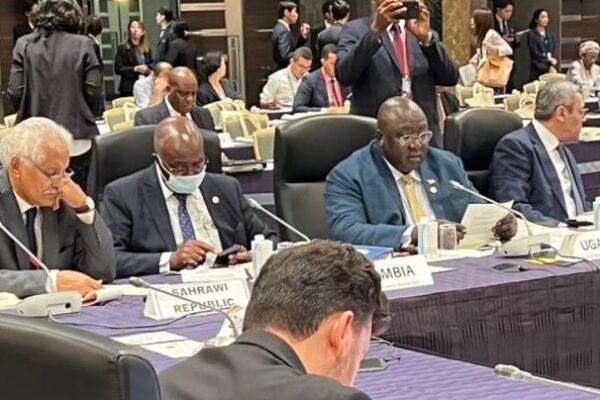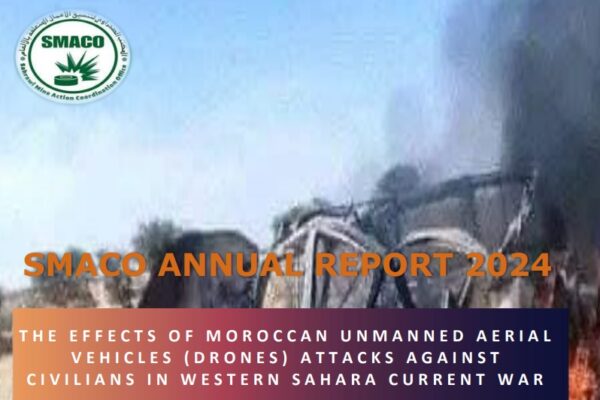History

The Sahrawi Arab Democratic Republic (SADR), known geographically as Western Sahara, sprawls across 266,000 square kilometers in Northwest Africa. Its borders are defined by Morocco to the north, Algeria to the northeast, and Mauritania to the East and South, while its western flank is embraced by a 1,200-kilometer-long coastline along the Atlantic Ocean. On the 27th of February 1976, the SADR was declared, with its provisional capital established at Bir Lehlou in the liberated territories.
Brief History
The annals of Western Sahara’s history unfurl as a tapestry woven with threads of ancient exploration and nomadic life. Dating back to the 5th century BC, the region bears the footprints of Carthaginian explorer Hanno the Navigator, though scant historical records remain from that era. Modern Western Sahara finds its roots intertwined with the nomadic tribes under Berber rule, who, in contact with the Roman Empire, established a cultural mosaic that persists to this day.
Despite its strategic location, Western Sahara has eluded centralized governance in the modern sense. Unyielding in the face of conquest, the region’s arid and rugged terrain proved a formidable barrier to external control, while the fierce warrior ethos of its tribes staunchly repelled foreign incursions. Although Islam arrived in the 8th century AD, the region remained largely isolated and underdeveloped, with neighboring kingdoms and emirates making minimal impact on its landscape.
From the 11th to the 19th centuries, Western Sahara emerged as a vital conduit between the Sub-Saharan and North African realms, fueled by the adept trade networks and camel caravans of the Sahrawi tribes. Renowned for their mastery of desert routes, Sahrawi warriors safeguarded and facilitated trade exchanges between the northern and southern reaches, solidifying their pivotal role in regional commerce.
During the 11th century, the Sanhaja tribal confederation, joined by the Lamtuna tribes, laid the foundations of the Almoravid dynasty, a seminal epoch in North African and Iberian history. The Almoravids, hailing from Sahrawi and Mauritanian stock, forged an expansive Muslim empire, extending their dominion across present-day Morocco, Western Algeria, and the Iberian Peninsula to the north, while venturing southward into present-day Mauritania and Mali, even reaching the realms of the Ghana Empire. This era of expansion brought about a cultural cross-pollination, as Sahrawi Berber-Arab tribes intermingled with Black Africans from Mali, Senegal, and Ghana, enriching Sahrawi society with diverse traditions in clothing and music, thereby shaping the mosaic of Sahrawi culture as we know it today.
Modern History
On 27 February 1976, the Sahrawi National Assembly (Parliament) proclaimed SADR as an independent State over the Territory of Western Sahara. The proclamation of the SADR was not only to fill in the vacuum left by Spain, the former colonial power, precipitated and unilateral withdrawal from the Territory on the 26th February 1976 in total violation of its obligations as the Administrating Power, but also to embody the sovereign will and political decision and aspirations of the Sahrawi people. This fact was clearly confirmed by the ruling of the International Court of Justice (ICJ) in 1975, which established that, prior to Spanish colonisation, Western Sahara was inhabited by autonomous and independent people (Para. 159) who were socially and politically organised under leaders competent to represent them (Para. 81). The Court further confirmed that no sovereign or territorial ties have ever existed between Morocco or Mauritania with the Territory of Western Sahara.
In 1981, SADR was admitted as a Member State of the Organisation of African Unity (OAU) and later became a founding Member State of its successor organisation, the African Union (AU). It secured official recognitions by more than 84 states, and consolidated its relations with a large number of countries in the world, mainly in Africa, the Caribbean, Latin America, Asia and South East Pacific region.
For over forty years, Morocco has illegally occupied parts of the Territory of the SADR. In doing so, Morocco has acted in defiance of the UN Charter, the Constitutive Act of the African Union and basic norms of international law.
Indeed, the presence of Morocco in Western Sahara has been “deplored” by the Security Council (res. 380 of 1975) and qualified expressly as an “occupation” by the UN General Assembly (res. 34/37 of 1979 and res. 35/19 of 1980). Morocco’s current military and civilian deployment in the occupied Territory of Western Sahara is illegal, and that is why the international community does not recognise Morocco’s militarily imposed presence in Western Sahara.
After 16 years of armed struggle against the Moroccan invasion, the OAU and the UN succeeded to broker a Settlement Plan in 1991, which was signed by both parties, and a UN Mission was established to supervise the organisation of a referendum on self-determination for the people of Western Sahara. Unfortunately, Morocco reneged all its agreements and hindered all efforts of the international community to secure the decolonisation of the territory so far.
The SADR is a full-fledged member State in the African Union that exercises its full sovereignty over the Sahrawi liberated territories. Despite Morocco’s continued occupation of parts of its land, the SADR has built well-functioning state institutions that provide public services to its citizens. Over the last four decades, SADR has had democratic governance, successfully running elections at the local and national levels. Moreover, for 27 years, the Sahrawi Liberation Movement, the Frente POLISARIO, has been committed to peace and to the adoption of diplomatic means to end Morocco’s illegal occupation of the Sahrawi Territories still under occupation within the framework of the international legality.
SADR has built a modern society that cherishes and promotes the values of social justice, democracy, gender equality, tolerance and the rule of law. The Sahrawi people can rightly pride themselves on having built an egalitarian society where every citizen can participate fully in the public affairs and where women play a fundamental role in all aspects of political, social and economic life. Saharawi women assume important leadership roles, including as governors of refugee camps, members of the POLISARIO highest leadership body, and members of the negotiating team in the UN-sponsored talks. Despite the lack of means SADR succeeded to secure free health services to all citizens and obligatory education to all kids. Literacy rates in SADR are amongst the highest on the continent.
SADR has also been undertaking consistent efforts in coordination with its neighbours to deter and prevent any illegal activities related to transnational organised crime and other security threats, and has actively participated, as a responsible partner, in the consolidation and effectiveness of regional security structures in conformity with its obligations as an AU Member State.
After ending the Moroccan occupation of the remaining parts of its national territory, SADR intends to strengthen and diversify its relations with all countries of the African Union and other members of the international community based on the objectives and purposes of both the AU Constitutive Act and the UN Charter.
Morocco was admitted as a member to the AU in 2017. Its occupation of parts of the territory of another member state is a dangerous violation of the core principles of the AU Constitutive Act, and a serious precedent that violates the principles and goals set by our Founding Fathers. The AU cannot allow that a Member State adopts expansionist and colonialist methods to expand its territory to the detriment of the territorial integrity of another Member State.
Freedom is indivisible. The Founding fathers of the OAU/AU principal objective was to eradicate colonialism, apartheid and segregation from the continent. Our duty as Pan Africanists is to continue struggling for the achievement of freedom for all our nations until all Africans are free.






